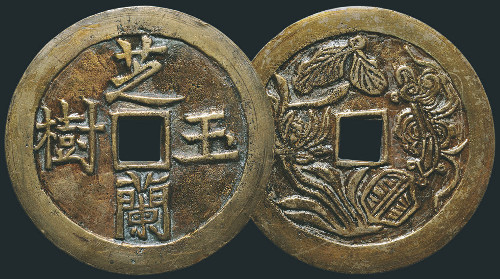When emperors ruled China, the dream of Chinese parents was to have a son successfully pass the imperial examinations and be appointed to an important government position bringing honor and prosperity to the family.
The charm displayed below is representative of the Chinese charms expressing such a wish.
This bronze charm has finely sculptured characters and a broad rim. Both the obverse and reverse sides are displayed together in the single image.
The Chinese inscription reads zhi lan yu shu (芝蘭玉樹). Zhi lan (芝蘭) translates as “irises and orchids” but has the implied meaning of “noble character”.
Yu shu (玉樹) translates as a “tree made of jade” but the expression is used to describe a handsome or talented young man. “Jade tree” also has the meaning of a “scholar tree” and is a laudatory title for sons.
The charm’s inscription therefore translates as a talented young man of noble character or a child with outstanding future prospects. Such an individual would be expected to do well in the imperial examinations.
The reverse side of the charm has what appears to be a random collection of objects.
On the left side is a lotus (he 荷).
Below the square hole at about the five o’clock position is a round box (he 盒) also known as a “treasure box” (bao he 宝盒).
A round box is the symbol for Han Shan (寒山), a Tang dynasty “laughing immortal” poet, who along with Shi De (拾得) are popularly known as the Immortals of Peace and Harmony (和合二仙). (A Chinese charm showing Han Shan holding his signature round “treasure box” may be seen here. Shi De is standing next to him holding a lotus which is his signature symbol.)
To the right of the square hole is a ruyi sceptre (如意) hanging vertically and wrapped in ribbons or fillets. (A ruyi may be seen more clearly on this charm.)
To understand the hidden meaning of this specific assembly of objects, one must understand that the Chinese love a visual pun also known as a rebus.
The “lotus” (he 荷) has the same pronunciation as “harmony” (he 和). The Chinese word for “box” (he 盒) has the same pronunciation as “union” (he 合). The “ruyi sceptre” (如意) has the same pronunciation as “as you wish” (ru yi 如意).
The visual pun is thus he he ru yi (荷盒如意) which has the meaning of “may you have a harmonious union with all your wishes fulfilled”.
This wish is commonly used in reference to marriages. In fact, the Immortals of Peace and Harmony mentioned above are believed to bestow blessings on marriages.
This charm, which has a diameter of 59.5 mm and was cast in Yunnan (云南) during the Qing dynasty (请朝 1644-1911), sold at a China Guardian Auction (中国嘉德国际拍卖有限公司) in 2015 for about $1,200 (RMB 8050).
Please see the article “Cassia and Orchid Charm” for a discussion of another Qing dynasty charm with a similar content.
